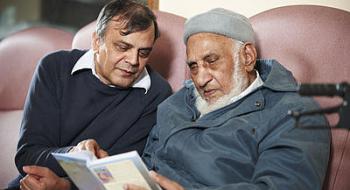Starting The Conversation - training in end of life care

Best Practice: Creating a training package called Starting the Conversation, for social care staff in end of life care
Who did it: Don Russell, Senior Social Worker Specialist Multi-Disciplinary Team, John Taylor Hospice in partnership with NHS West Midlands and Birmingham City Council Adults and Communities
John Taylor Hospital, Erdington, Birmingham was comissioned by NHS West Midlands to create an information and training package for social care staff in end of life (EOL) based on person-centred care planning.
We based our thinking on the National End of Life Care Programme's Supporting people to live and die well: a framework for social care at end of life - downloadable below - and my own previous experience as a social worker in an adults and communities team including my lack of EOL training.
In June 2011 we - the social worker and the manager of the specialist multi-disciplinary team (MDT) from John Taylor Hospice - met with Birmingham City Council’s workforce and planning leads to develop an EOL training questionnaire.
The questionnaires were distributed to social care staff (social workers, care coordinators and home care organisers) and returned to the hospice where the manager and I analysed them. 233 were returned and 212 expressed a need for specific EOL training.
Based on the questionnaires we devised a training programme with three objectives:
- To raise awareness of end of life of issues and the resources available in both health and social care
- To develop and identify assessment tools and resources to equip social care staff with the knowledge, skills and confidence to deal with EOL issues
- To enable effective partnership working.
The training consisted of three sessions.
Session One
- Aspects of support
- What is palliative care?
- Patient concerns checklist
- Dialogues in dying
Session Two
- Policies which enhance end of life care
- Supporting people to live well die well
- Gold standard framework
- Supportive care pathway
- Preferred priorities for care
- Advanced care planning
Sessions Three (Guest speakers)
- Community nurse specialist
- Specialist multi-disciplinary team
- Hospice at home
- Family support team
A resource pack with information and internet links was provided for each participant to take away.
Also in conjunction with the workforce and planning team we devised an evaluation proforma to measure pre and post training understanding of the EOL for the participants.
I delivered training to 105 social care staff including home care organizers, social workers and care co-ordinatiors during October 2011.
A full day’s training for staff who worked within the areas covered by John Taylor Hospice and who could access services from the hospice was carried out over five separate days with 15 places per day. A further two half days of training on sessions one and two were provided for 30 staff who could not access services from the hospice.
Short Term Impact
There was a positive response from the training and many participants in their evaluation were requesting further information and training. Participants said they now felt more confident in discussing end of life with patients. They also felt they had a clearer understanding of the strategies in end of life from a health perspective.
Long Term Impact
As a result of the training 49 participants stated a desire to be involved as end of life champions (see Living Well, Dying Well pg 28 5.3 objective 8). This has resulted in the workforce and planning team being in the process of setting up a program to identify EOL champions out of these 49 who could meet quarterly with the hospice social worker to share EOL information which they could take back and cascade to their own terms. They would also keep the hospice updated of social work developments in the community. It may be in the future to have further integration including other services such as housing.
Key Things
My background of 20 years in social care followed by two years in healthcare has given me an understanding of both perspectives. I think this in essential for anyone involved in leading the training.
For further information contact Don Russell, Senior Social Worker Specialist Multi-Disciplinary Team, John Taylor Hospice at donald.russell@benpct.nhs.uk